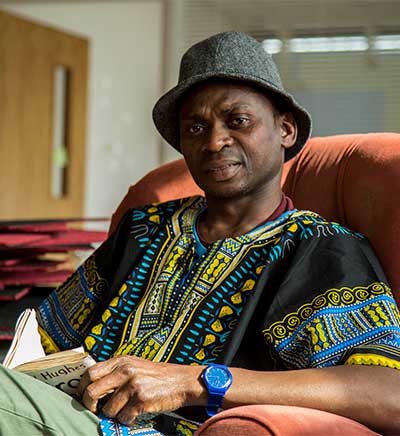ADEYINKA AKINWANDE
 PERFORMANCE POET & CARER FOR THE ELDERLY BELIEVES WORDS AND MUSIC ARE THE BEST MEDICINE.
PERFORMANCE POET & CARER FOR THE ELDERLY BELIEVES WORDS AND MUSIC ARE THE BEST MEDICINE.
Interviewed by Jo Reynolds
How long have you worked here?
(Laughs.) A long time, since 2008.
Where did you grow up?
I was born and bred in Nigeria, in Lagos, home of wisdom, the city by the endless shimmering ocean, what we call 'legbelegbe' (beautiful).
Of your many talents, one is caring for the elderly. What drew you to social work?
Looking after people is in my blood. I love it. My passion to look after vulnerable people began in the community I grew up in. In my home country, people are not paid to look after the elderly. The house is always full of people, relatives, nieces, nephews, children, grandchildren, and their friends. I have 15 brothers and sisters. In such a house, any elderly must be looked after by the aforementioned. We have a saying back home: when a rabbit grows old, it feeds on the child's breast milk.
We believe children who do not look after their elders are cursed
Who do you care for here?
When I came to the UK in 2007, I was introduced to a very nice Jewish family. The father was ill and so I looked after him for 4 years until he died. I worked with Care UK, and now am with MiHomecare in Hammersmith. I also do some private care.
What is a typical day?
Most days I care for about eight people. I work with individuals, helping with everything they need to make them comfortable – personal care, medication, meals, even taking them out on social outings like cinema, museums and other places of interest that will make them feel they belong. I also care for groups of vulnerable individuals by organising events, for example, coffee mornings in Askew Road Library. I visit care homes to perform drama and songs and poetry. I also involve vulnerable adults in some of my entertainment projects. They give speeches, do drama, and read poems.
How do you perform?
I perform my poems as drama. I often play local African drums and dance and sing. I also use sounds to marry the rhythms in a musical way. For example, I tell a story about a man on a journey and I make the sound of his walking stick with my drum – Ka! Ka! Ka! And I mix African language with English. I love using my language, Yoruba.
Do your performances help?
Oh yes! Entertainment is a medicine on its own. Many old people are depressed, many have dementia, many are bedbound. Many are lonely and need someone to talk to and tell about their past life. For example, I cared for a man who was a DJ. When I got in the house, I said, how are you? He said, bad – I am tired. We began to chat, talking about old school music, African songs, Hugh Masekela, Fela Kuti, Manu Dibango, King Sunny Adé. I sang some songs and suddenly he started smiling. As I served his meal, we sang those songs together. I also did some of my poems. (Laughs.) By the time I was leaving he said, you made my day.
You see, these people do not only need medications.
Is Nigeria's attitude to the elderly different to Britain's?
Yes, Nigerians believe in community and household caring. The household must see to the care of the vulnerable. I grew up in a community where you are mandated to look after the elderly. And when a couple gives birth to a child, the whole community must look after the child. In that community, you won't pass by an elderly person without saying a greeting, and when you greet them, the elder will ask, whose child are you?
Are you expected to care for your parents?
Definitely yes! We believe children who do not look after their elderly ones are cursed.
Is your family creative?
My mother was a great storyteller.
Tell us about your charity.
I am co-founder with my sister of the Hope Rise Ayinke Foundation, a charity in my mother's name that honours victims of fire. We recently honoured (artist) Khadija Saye and her mother Mary Mendy who both died in the Grenfell Tower fire. I worked with both of them as carers. It's painful.
Do we respect carers enough in this country?
Not at all. Many carers are attacked by family members and they have so little travelling time to clients. And we only hear of them if a few do things wrong. Then it will be all over the news. Many carers end up sick from stress, with too much walking and working with little pay package.
If you were Prime Minister, how would you improve social care in the UK?
Cancelling zero-hour would be my first priority.
As well as care work, you've performed your poems on stage and screen. What have been some highlights?
During Hammersmith and Fulham Council's Arts Festival, I performed my poem for Queen Elizabeth's 90th birthday, which I titled Lonely Old Lady. And I performed at the Bush Theatre in The Neighbourhood Project. The Bush Theatre has been very kind to me. I've performed my poems in a number of short films, as well as reading Ted Hughes's children's story The Iron Man for Hilary Powell at the BBC. I performed at the World Mental Health day as well.
How do you relax and with whom?
With my son Michael, who is my friend as well as my son. We play football or go to the cinema.
What's your best advice for someone who wants to earn a living from being creative?
Believe in yourself and persevere. It looks like you are crazy, but that is creativity! (Laughs.)
Thank you, Adeyinka. It's been a real pleasure to meet you.
Interviewed Aug 2019
Photo by Dan Edelstyn